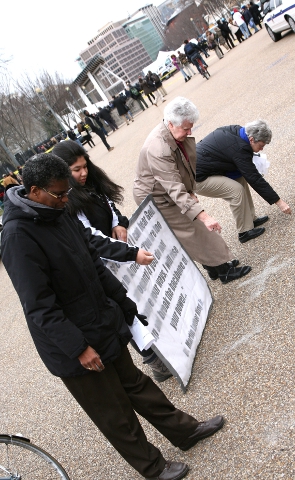
Participants in an Ash Wednesday service hosted by the Dorothy Day Catholic Worker Community spread ashes outside the White House in a call for repentance Feb. 14 (Photo courtesy of Ted Majdosz)
As Pope Benedict looks to shore up his legacy in the last two weeks of his pontificate, he used one of his last general audiences Wednesday to cite three 20th century writers as examples of deep conversion to faith.
Among those Benedict mentioned was Dorothy Day, the late New Yorker who was the co-founder of a continuing radical U.S. Catholic movement focused on embracing voluntary poverty and living out the works of mercy.
An agnostic and even Marxist until her conversion to Catholicism at age 30, Day was also sharply critical of U.S. foreign policy, especially its use of nuclear deterrence.
Mentioning Day in his audience Wednesday, Pope Benedict said her conversion to Catholicism evidenced a "search for truth and open[ing] herself up to the discovery of faith."
"The journey towards faith in such a secularized environment was particularly difficult, but Grace acts nonetheless," said Benedict, according to a Vatican Radio translation of his remarks.
Benedict went on to cite Day's own writing: "It is certain that I felt the need to go to church more often, to kneel, to bow my head in prayer. A blind instinct, one might say, because I was not conscious of praying. But I went, I slipped into the atmosphere of prayer ... "
"God guided her to a conscious adherence to the church, in a lifetime spent dedicated to the underprivileged," Benedict said.
Day's movement, known loosely as the Catholic Worker, stems from her and French immigrant Peter Maurin's opening of a house in New York in 1933, which they opened to anyone needing food, shelter, or other necessities.
There are now more than 100 houses throughout the world that loosely align themselves with Day and Maurin's example by focusing on living out the works of mercy.
Other 20th century examples of faith Benedict cited in his audience were Pavel Florensky, a Russian Orthodox theologian and priest, and Etty Hillesum, a Jewish woman who is known for a journal she kept during the German occupation of Amsterdam during the Second World War. Hillesum would later die at Auschwitz.
Day, who died in 1980, is under consideration for sainthood. Her cause is currently open and she is formally considered a "Servant of God."
Many of the Catholic Worker communities inspired by her example continue to sharply criticize U.S. foreign policy, especially its use of unmanned military drones in the Middle East.
In one example, the Dorothy Day Catholic Worker Community in Washington, D.C., is hosting an Ash Wednesday "Witness of Repentance" outside the White House.
"On Ash Wednesday people from the faith-based peace and justice community in the D.C. area will hold a prayer service in front of the White House to call for repentance and conversion of ourselves, our society and our churches to the Gospel way of justice, nonviolence and a reverence for all life and creation," the community states on its website.
"We call for an end to all war and the elimination of all weapons -- from guns, to drones, to nuclear weapons."
[Joshua J. McElwee is an NCR staff writer who is also a member of the Holy Family Catholic Worker House community in Kansas City, Mo. His email address is jmcelwee@ncronline.org.]


